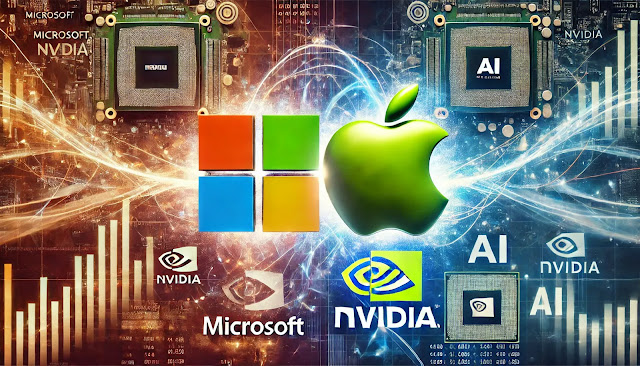In the volatile world of stock markets, the positions of top companies can shift swiftly, as evidenced by Nvidia Corp.'s recent experience. After a short stint as the world's most valuable company, Nvidia saw its market cap plummet by over $220 billion in just two days, pushing it below tech giants Apple Inc. and Microsoft Corp. While Nvidia's rapid rise and subsequent drop highlight the unpredictable nature of stock valuations, it also underscores the resilience of its megacap peers.
The Tech Titans: Microsoft and Apple
Microsoft and Apple have long been stalwarts in the technology sector, consistently delivering strong financial performance and maintaining robust market caps. As of the latest data, Microsoft's market cap stands at $3.3 trillion, while Apple's is close behind at $3.2 trillion. Their ability to maintain these valuations, even in the face of market turbulence, is a testament to their diversified business models and strong fundamentals.
Microsoft's strength lies in its diversified revenue streams, spanning cloud computing (Azure), software (Office 365), and gaming (Xbox). This diversification helps cushion the company against sector-specific downturns. Similarly, Apple's ecosystem of hardware (iPhones, iPads, Macs), software (iOS, macOS), and services (Apple Music, iCloud) provides a stable revenue base, ensuring resilience against market volatility.
Nvidia's Meteoric Rise and Risks
Nvidia's rise to the top was fueled by the explosive growth in demand for its AI-driven semiconductor solutions. Over the past year, Nvidia's stock climbed nearly 200%, driven by its dominant position in the AI and data center markets. However, this rapid ascent has made the stock vulnerable to sharp corrections, as seen in the recent 6.7% drop over two days.
The primary risk for Nvidia lies in its valuation. With such a steep climb, the stock becomes susceptible to profit-taking and market corrections. Moreover, the company's heavy reliance on the AI sector means any slowdown in AI adoption or advancements could significantly impact its performance. The recent selloff, driven by investor fatigue and options expiry, highlights the inherent volatility in Nvidia's stock.
The AI Rally: Continued Potential
Despite the recent setbacks, the AI rally is far from over. Analysts remain bullish on Nvidia, citing its strong fundamentals and leadership in AI technology. Ben Reitzes of Melius Research recently raised his price target on Nvidia shares to $160 from $125, marking the fifth increase this year. This optimism is shared by others who see Nvidia absorbing a larger portion of the enterprise application software market cap as profits shift towards AI-driven solutions.
However, the broader market dynamics also play a crucial role. The recent market retreat coincided with a triple-witching session, where options contracts expire, and indices like the S&P Dow Jones shuffle their weightings. These events can cause significant market turbulence, impacting individual stock performances.
The Resilience of Big Tech
While Nvidia's journey underscores the potential volatility in the AI sector, Microsoft and Apple's resilience offers a stark contrast. Their ability to maintain strong market positions amidst fluctuations highlights the importance of diversified business models and solid fundamentals. As the AI rally continues, these tech giants are well-positioned to capitalize on emerging opportunities while mitigating risks associated with rapid market shifts.
In conclusion, while Nvidia's recent drop serves as a reminder of the market's unpredictability, the overall potential of AI remains strong. Investors should be mindful of the risks but also recognize the enduring strength and adaptability of tech giants like Microsoft and Apple, which continue to navigate the evolving landscape with resilience and foresight.

Comments
Post a Comment